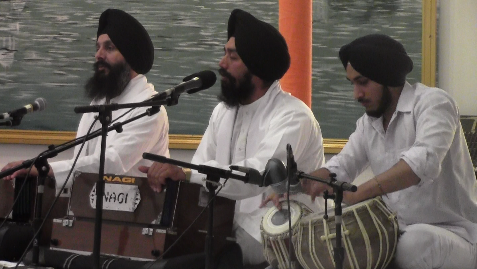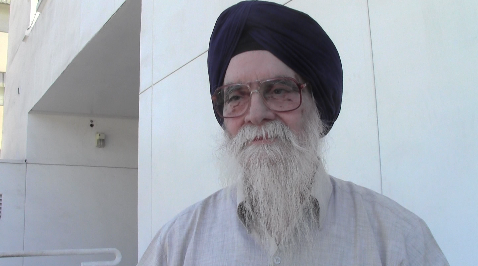Turbans Don't Mean Terrorists

Outside of the Gurdwara, in a post 9/11 era, Sikhs face discrimination on a daily basis. Despite only one reported case of a hate crime in 2011 in Los Angeles, an official at the Los Angeles County Commission on Human Relations says the city’s low hate crime rate is not indicative of a decrease in discrimination across the county.
“I would say that the numbers have mercifully been low, for the last ten years. What we do hear of is persistent complaints of others forms of intolerant or discriminatory behavior which doesn’t reach the actual level of a hate crime,” said Marshall Wong, Senior Intergroup Relations Specialist.
While numbers and experiences show a decrease in hate crimes across Los Angeles, hate crimes nationwide against Indians, Muslims, and Sikhs have soared by 50 percent in recent years. Recent examples of such attacks include the beating of Columbia University professor Prabjot Singh, the harassment of truck-driver Jagjeet Singh, and the social media backlash after Nina Davuluri, an Indian-American was crowned ‘Miss America.” Perhaps the most shocking incident of racial tension against Sikhs was the 2012 shooting in a Wisconsin Gurdwara. Six Sikhs were killed by Wade Michael Page, a 40-year-old former soldier who played for a white supremacist rock band.
Manjusha Kulkarni, a Hindu lawyer and Executive Director of the South Asian Network in Artesia, California, says she is sympathetic to the way Sikhs are treated because of her first hand experience of discrimination.
“When we (she and her husband) go to hotels, other guests will just assume that because we are the only brown people there that we must be waiters or maids or something like that,” Kulkarni explained.
According to Kulkarni, people of color experience ‘spirit murder’ in a predominantly white world. ‘Spirit Murder’ is a concept from critical race theory that argues people of color experience face discrimination on a daily basis, and that discrimination, according to theorists, eats at the soul. Kulkarni says there aren’t enough instances or examples of discrimination that would demand a lawsuit, but there are enough examples to alienate people of color from whites.
“They remind you, that you are the other, and that you’re not meant for places that are meant for Caucasians,” said Kulkarni.
Davinder Singh Hundal, an elderly man at the Vermont Gurdwara, stands slightly

“After 9/11 because of our turban, though it is not tied the same way as the Muslim people tie their turbans, we were suspected as Muslims. We were suspected as terrorists. Actually we are not, it makes us feel very bad,” he said.
Satwinder Singh Thiara, a high school-age Sikh who attends the Vermont Gurdwara, says members of his generation, unlike their parents and grandparents, believe discrimination is declining.
“I was kind of sheltered away from that since I was a little kid. I’ve rarely been called a terrorist or have been insulted. In middle school I faced a lot more of that, mainly things said against my turban or my facial hair. Once I got into high school I found people more understanding and trying to take up the Sikh’s cause”, he said.
The L.A. County Commission on Human Relations says it will continue to work with law enforcement and other organizations to monitor and reduce discrimination.
In the meantime, Hundal stands in the doorway of the Vermont Gurdwara handing out pocket sized booklets that provide a simple explanation of Sikhism.
“If we educate people about our religion they won’t be scared,” says Hundal.



